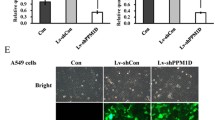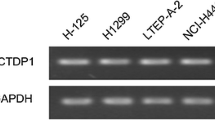Abstract
MED19 is a subunit of Mediator that is an essential component of RNA polymerase II-mediated transcription machinery. High expression levels of MED19 were examined in human lung adenocarcinoma tissues by immunohistochemical assay. MED19-specific short hairpin RNA (shRNA) expressing lentivirus was constructed and infected lung cancer cell line A549. MED19 mRNA and protein expression levels were downregulated in A549 cells as evidenced by real-time PCR and western blot assays. Importantly, MED19 inhibition resulted in impaired proliferation and colony formation, and induced accumulation of G1-phase cells and mitigated invasiveness of cells. More importantly, downregulation of MED19 expression reduced the tumorigenicity of A549 cells in vivo. It was suggested that MED19 is a novel proliferation regulator that promotes growth of lung cancer cells, thereby indicating that MED19 may serve as a new molecular target for lung cancer therapy.






Similar content being viewed by others
References
Parkin DM, Bray F, Ferlay J, Pisani P (2005) Global cancer statistics, 2002. CA Cancer J Clin 55:74–108
Lin RK, Wu CY, Chang JW, Juan LJ, Hsu HS, Chen CY, Lu YY, Tang YA, Yang YC, Yang PC et al (2010) Dysregulation of p53/Sp1 control leads to DNA methyltransferase-1 overexpression in lung cancer. Cancer Res 70:5807–5817
Sun S, Schiller JH, Spinola M, Minna JD (2007) New molecularly targeted therapies for lung cancer. J Clin Investig 117:2740–2750
Ansari SA, He Q, Morse RH (2009) Mediator complex association with constitutively transcribed genes in yeast. Proc Natl Acad Sci USA 106:16734–16739
Baidoobonso SM, Guidi BW, Myers LC (2007) Med19(Rox3) regulates intermodule interactions in the Saccharomyces cerevisiae mediator complex. J Biol Chem 282:5551–5559
Casamassimi A, Napoli C (2007) Mediator complexes and eukaryotic transcription regulation: an overview. Biochimie 89:1439–1446
Conaway RC, Sato S, Tomomori-Sato C, Yao T, Conaway JW (2005) The mammalian mediator complex and its role in transcriptional regulation. Trends Biochem Sci 30:250–255
Sato S, Tomomori-Sato C, Parmely TJ, Florens L, Zybailov B, Swanson SK, Banks CA, Jin J, Cai Y, Washburn MP et al (2004) A set of consensus mammalian mediator subunits identified by multidimensional protein identification technology. Mol Cell 14:685–691
Vijayvargia R, May MS, Fondell JD (2007) A coregulatory role for the mediator complex in prostate cancer cell proliferation and gene expression. Cancer Res 67:4034–4041
Singh H, Erkine AM, Kremer SB, Duttweiler HM, Davis DA, Iqbal J, Gross RR, Gross DS (2006) A functional module of yeast mediator that governs the dynamic range of heat-shock gene expression. Genetics 172:2169–2184
Li LH, He J, Hua D, Guo ZJ, Gao Q (2010) Lentivirus-mediated inhibition of Med19 suppresses growth of breast cancer cells in vitro. Cancer Chemother Pharmacol. doi.10.1007/s00280-010-1468-9
Guo W, Zhang Y, Chen T, Wang Y, Xue J, Zhang Y, Xiao W, Mo X, Lu Y (2011) Efficacy of RNAi targeting of pyruvate kinase M2 combined with cisplatin in a lung cancer model. J Cancer Res Clin Oncol 137:65–72
Tsai BY, Suen JL, Chiang BL (2010) Lentiviral-mediated Foxp3 RNAi suppresses tumor growth of regulatory T cell-like leukemia in a murine tumor model. Gene Ther 17:972–979
Livak KJ, Schmittgen TD (2001) Analysis of relative gene expression data using real-time quantitative PCR and the 2(−Delta Delta C(T)) method. Methods 25:402–408
Gao LF, Xu DQ, Wen LJ, Zhang XY, Shao YT, Zhao XJ (2005) Inhibition of STAT3 expression by siRNA suppresses growth and induces apoptosis in laryngeal cancer cells. Acta Pharmacol Sin 26:377–383
Cano A, Pérez-Moreno MA, Rodrigo I, Locascio A, Blanco MJ, del Barrio MG, Portillo F, Nieto MA (2000) The transcription factor snail controls epithelial-mesenchymal transitions by repressing E-cadherin expression. Nat Cell Biol 2:76–83
Hartwell KA, Muir B, Reinhardt F, Carpenter AE, Sgroi DC, Weinberg RA (2006) The Spemann organizer gene, Goosecoid, promotes tumor metastasis. Proc Natl Acad Sci USA 103:18969–18974
Dettmann A, Jaschke Y, Triebel I, Bogs J, Schroder I, Schuller HJ (2010) Mediator subunits and histone methyltransferase Set2 contribute to Ino2-dependent transcriptional activation of phospholipid biosynthesis in the yeast Saccharomyces cerevisiae. Mol Genet Genomics 283:211–221
Kornberg RD (2005) Mediator and the mechanism of transcriptional activation. Trends Biochem Sci 30:235–239
Maemondo M, Inoue A, Kobayashi K, Sugawara S, Oizumi S, Isobe H, Gemma A, Harada M, Yoshizawa H, Kinoshita I et al (2010) Gefitinib or chemotherapy for non-small-cell lung cancer with mutated EGFR. N Engl J Med 362:2380–2388
Marchetti A, Martella C, Felicioni L, Barassi F, Salvatore S, Chella A, Camplese PP, Iarussi T, Mucilli F, Mezzetti A et al (2005) EGFR mutations in non-small-cell lung cancer: analysis of a large series of cases and development of a rapid and sensitive method for diagnostic screening with potential implications on pharmacologic treatment. J Clin Oncol 23:857–865
Möller E, Stenman G, Mandahl N, Hamberg H, Mölne L, van den Oord JJ, Brosjö O, Mertens F, Panagopoulos I (2008) POU5F1, encoding a key regulator of stem cell pluripotency, is fused to EWSR1 in hidradenoma of the skin and mucoepidermoid carcinoma of the salivary glands. J Pathol 215:78–86
Chiosea SI, Barnes EL, Lai SY, Egloff AM, Sargent RL, Hunt JL, Seethala RR (2008) Mucoepidermoid carcinoma of upper aerodigestive tract: clinicopathologic study of 78 cases with immunohistochemical analysis of Dicer expression. Virchows Arch 452:629–635
Fehr A, Roser K, Heidorn K, Hallas C, Loning T, Bullerdiek J (2008) A new type of MAML2 fusion in mucoepidermoid carcinoma. Genes Chromosomes Cancer 47:203–206
Acknowledgments
This study was supported by the grants from the Science and Technology Services of Jilin Province scientific and technological project (#200505120, 20050408-1, 20070720, 200805120, and #20090732), the Natural Science Foundation of China (#30670301 and 30870354), and in part by the Jilin province talent development foundation (JRJB#2007-2).
Author information
Authors and Affiliations
Corresponding author
Rights and permissions
About this article
Cite this article
Sun, M., Jiang, R., Li, Jd. et al. MED19 promotes proliferation and tumorigenesis of lung cancer. Mol Cell Biochem 355, 27–33 (2011). https://doi.org/10.1007/s11010-011-0835-0
Received:
Accepted:
Published:
Issue Date:
DOI: https://doi.org/10.1007/s11010-011-0835-0




